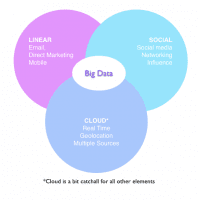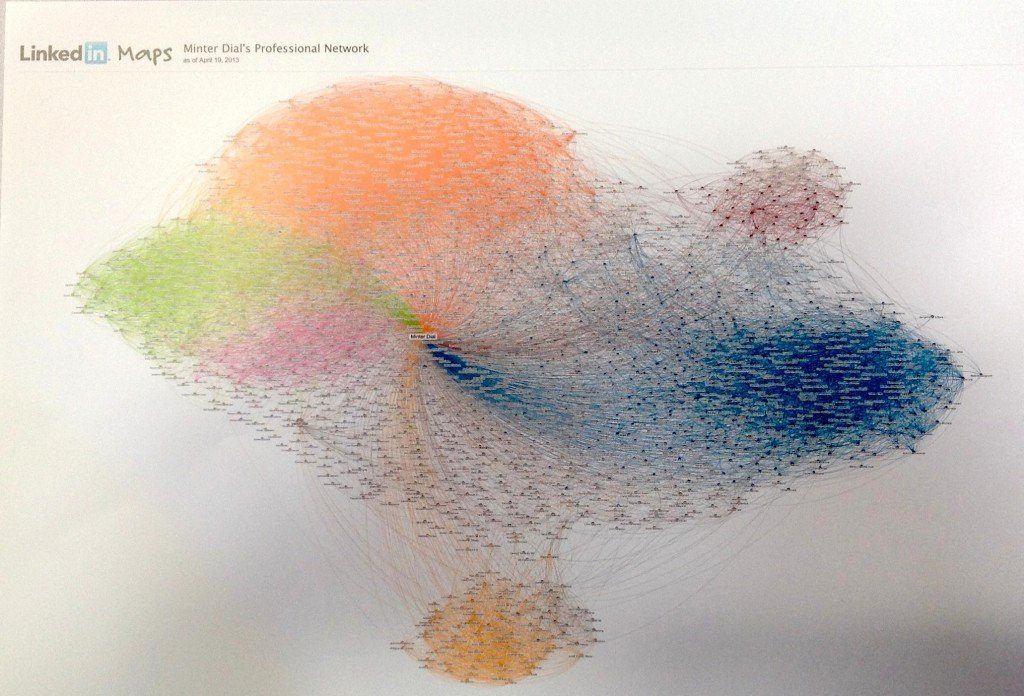Big data is Dead, or Big Data* is really a Big Headache
Specifically, for 99% of companies, big data is dead before we even started talking about it. Why? Because it is a vast, vague and unfriendly term for businesses to grapple with. As a core business-building concept, big data is dead because most companies cannot even cope with small data. {Click here to Tweet!}. As Mitch Joel said recently, “most businesses are terrible at small data,” such as linear (email, direct marketing, etc.) and circular (semantics, social…) data.
Just think how many times in the past, marketing teams created incentives requiring personal data from their own or potential customers and, yet, the goldmine of information lay on postcards in a cardboard box under the desk until the next product marketing manager arrived and jettisoned them in disgust (at the dust).
Big data requires a new marketing mindset
If it were not enough that brands do not truly indulge in customer centricity, the scale and complexity of collecting, collating and exploiting the reams of uncoordinated and real-time data is beyond the scope of most mid-tier managers, much less older managers who were — and for the large part, still are — old school marketers.
Start with the small data

Before tackling big data, companies should look to improve how they manage small data. That is the personalized, relevant data at the granular level and includes the grand opportunities in social. The challenges with big data are beyond technological (e.g. finding the right, affordable database system). They include legal issues (privacy, personal data management/opt-in) as well as creating an editorial line that, over time, will make customers be thankful to be a part of one’s contact list.
Sophisticating Customer Relationship Managment
I like to say that there are three levels of CRM, in ascending order of complexity and power:
- Basic or linear CRM (credit to Mitch) – using email, mobile, direct marketing
- Social CRM – integrating social media
- Big Data CRM – geolocation, real time, multi-platforms…
The issue is mobilizing all the necessary parties to access and distribute the relevant customer information without suffering from archaic organizational structures and me-me-me mentalities. Geting from #1 to #2 is already a sizeable effort.
Data Visualization

A subject that could be a subset of big data management is the visualization of data. There are increasingly more sophisticated tools out there that help to render the data visual and/or understandable (read here on some other data visualization tools). It’s not about the data, after all. It’s what you do with the data that counts. {Click to Tweet!}. Once you have collected the data, the question then becomes how to interpret it, to create useful customer insights, or as we say in the jargon customer intelligence.
Big Data ROI
If big data is dead, it isn’t because it doesn’t exist. It is more that managing big data is like having brands trying to run before they can walk. Pure player companies, which did not start off with an offline customer base, which are managed by data geeks and who are de facto obsessed with customer centricity are going to be better able to make heads and tails of the big data coin toss. [Read: Amazon, Gilt…] But, for the others, the quest for a big data ROI will likely be the fortune of external consultants. {Click to Tweet!}
First off, companies running up the big data flagpole will be stuck searching for a user-friendly, affordable database management system that integrates into their infrastructure. They will be faced with teams that don’t work together seamlessly. They will struggle to have the agility to stay up in real time with the latest sources of information in order to keep a complete customer profile, much less interact with those customers spontaneously and authentically.
Big data is more about a mindset than a data set. {Click to Tweet} That is why it is dead in the water for most companies.
I await your rebuttals or affirmations!
*See here for a definition from SmartDataCollective [link defunct] of Big Data: A phenomenon defined by the rapid acceleration in the expanding volume of high velocity, complex and diverse types of data. Big Data is often defined along three dimensions– volume, velocity and variety.











Very interesting post as usual. Thank you Minter for this. Indeed one of the questions is how to effectively manage small data to start with before tackling at big data. But, this being said and imagine the handling of small data is under control, there is the aspect of local legislation about the keeping, processing and shielding of the data collected. The internet is world-wide and to comply with the (local) legislation like the EU-privacy law etc. big data collection is essential as Geo-localization is needed to shield and treat the info collected accordingly. To be effective and safe, major players in an organization have a say so. The 'nerds' who conceive the software needed to collect and precess; the legal department who with fright look at the small letters of the law when implementing; the marketing department eager to use and apply for turn-over increase; customer relation for obvious reasons; the heads like VP's who are responsible for the over whole implementation and towards the shareholders etc. All these people should be 'digitally aware' for a effective handling of small and big data. We will need a few more generations shuffles to have all these people looking in the same direction, and world legislators realizing that individuals have a personal responsibility for the info they provide and government cannot and should not interfere in the process, for it makes an effective and safe implementation near to impossible. In other words, self-regulation should be the key with a 'www-etiquette' by which the use of collected info should clearly be available for the supplier, with the right to manage, correct of withdraw.
Very interesting post as usual. Thank you Minter for this. Indeed one of the questions is how to effectively manage small data to start with before tackling at big data. But, this being said and imagine the handling of small data is under control, there is the aspect of local legislation about the keeping, processing and shielding of the data collected. The internet is world-wide and to comply with the (local) legislation like the EU-privacy law etc. big data collection is essential as Geo-localization is needed to shield and treat the info collected accordingly. To be effective and safe, major players in an organization have a say so. The 'nerds' who conceive the software needed to collect and precess; the legal department who with fright look at the small letters of the law when implementing; the marketing department eager to use and apply for turn-over increase; customer relation for obvious reasons; the heads like VP's who are responsible for the over whole implementation and towards the shareholders etc. All these people should be 'digitally aware' for a effective handling of small and big data. We will need a few more generations shuffles to have all these people looking in the same direction, and world legislators realizing that individuals have a personal responsibility for the info they provide and government cannot and should not interfere in the process, for it makes an effective and safe implementation near to impossible. In other words, self-regulation should be the key with a 'www-etiquette' by which the use of collected info should clearly be available for the supplier, with the right to manage, correct of withdraw.
NSA and various US agencies are using it, so are lots of gov all around the world (including France), and a lot of big corporations…
NSA and various US agencies are using it, so are lots of gov all around the world (including France), and a lot of big corporations…
Isn't Internet Big Data? If it is, it's surely alive and kicking. Thanks to all of us here.
My recent post Taking Readers to Your Company's Opinion Leaders
Isn't Internet Big Data? If it is, it's surely alive and kicking. Thanks to all of us here.
My recent post Taking Readers to Your Company's Opinion Leaders
Can't argue with a single thing here. The single biggest problem we are facing is not whether or not the data exists (it does). It's unlocking that data from the silos they are now in and making them available to be mined for insights. Huge issue.
Can't argue with a single thing here. The single biggest problem we are facing is not whether or not the data exists (it does). It's unlocking that data from the silos they are now in and making them available to be mined for insights. Huge issue.
Minter – nice summary. But BigData is a hype… thus it is easy to call it dead. There are many things you can do with SQL. The good old BI gets revamped and is alive and kicking. Nevertheless… Big Data means as well to have the ability to drill down to new insights you might not have thought about before.
Minter – nice summary. But BigData is a hype… thus it is easy to call it dead. There are many things you can do with SQL. The good old BI gets revamped and is alive and kicking. Nevertheless… Big Data means as well to have the ability to drill down to new insights you might not have thought about before.
Hi Minter. Had to think about you yesterday Aug. 7, when Big Data was a News Topic on the French A2 "Journal de 20h". I always find interesting to see how some topics are literally hanging in the air and suddenly receive attention from various parts. Alertness and feeling for priority comes from those who are ahead with their remarks and questions and on the ball – like The Myndset. Bravo.
Hi Minter. Had to think about you yesterday Aug. 7, when Big Data was a News Topic on the French A2 "Journal de 20h". I always find interesting to see how some topics are literally hanging in the air and suddenly receive attention from various parts. Alertness and feeling for priority comes from those who are ahead with their remarks and questions and on the ball – like The Myndset. Bravo.